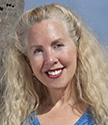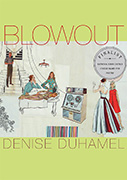





Poet, novelist, essayist, and prolific translator Forrest Gander was born in Barstow, California. The landscapes of Mexico, Arizona, and the Mojave Desert find their place in several books of his poetry, including his most recent, Be With (New Directions, 2018). He has translated poetry from Spain and Latin America, bringing the work of such writers as Pablo Neruda and Raúl Zurita to new audiences. Gander has also written two novels, The Trace (New Directions, 2014) and As a Friend (New Directions, 2008), and received numerous awards in recognition of his writing. He formerly was on the faculty at Brown University. We caught up with him shortly after the 2016 publication of Alice Iris Red Horse: Selected Poems of Yoshimasu Gozo, which Gander edited for New Directions Press.
Danielle Kessinger for The Florida Review:
This is such a fascinating work, Alice Iris Red Horse. You’ve worked with a lot of translations—how was it different working with one where the script is different, when you’re dealing not just with a different language, but different characters?
Forrest Gander:
Gozo Yoshimasu is a completely unique writer. In a way he is moving poetry into a beyond of writing, into a kind of performance. And he uses Korean Hangul and Chinese characters, as well as three different kinds of Japanese scripts plus French, English, and a colored system of writing kanji. In a way, he’s making available to us a whole new way of reading. You can’t read this book like you would an ordinary book.

TFR:
It was very interesting—as an editor, you weren’t just looking at the different pieces but also you had the different translators. It seemed there were also different styles within the translations.
Gander:
That’s right, because his work is so unique and because it’s so open-ended in many ways. The sort of failures of earlier translations of Gozo have been that they flattened out his work a lot. Right now, we’re suddenly availed of a new generation of Japanese translators. And I was in contact with a lot of them and thought the best way to present his work would not be to have a single voice but to have people approaching his work from different directions. Because the book is as much about what translation is, how one would translate this, as it is about the particular translation.
TFR:
Did you always have the idea to have the translators’ notes as part of the book? That was fascinating. Reading how they approached the task of translation was so interesting.
Gander:
It’s just as interesting and sometimes as interesting as the poetry itself because it opens up all of the layers like the night-blooming cereus. Gozo is like the poet of the night-blooming cereus where there’s a flower inside a flower inside a flower. And the translators are able to talk about how they deal with subtleties of trying to bring some of that out, including homophonic play and typographic play that work in Asian languages that don’t work in English at all. In other words, they had to ask, How do you deal with that as an English-language translator?
TFR:
In some places, I noticed they chose to keep some of the katakana and hiragana and kanji. And in others they wrote in Roman characters. There was one poem where the type was in orange and then it said “mikon” [referring to a visual symbol, logo, icon, or avatar]. And I wasn’t certain how much of that was because of how it was laid out in the original or a choice in the translation?
Gander:
It’s trying not to just stuff the strangeness and the fabulousness of the multi-lingual original into a shoe of conventional English language. And so, looking for ways to expand the notion of translation sometimes by including both languages. And Gozo uses symbols that he makes up also that we have to translate or choose to keep the same.
TFR:
I wanted to kind of call my friends in Japan and be like, “I want you to go read the original and then I want you to go read the translations and then I want your feedback. ”
[laughter]
Gander:
But no two people, who read the original, even in Japanese, will have the same reading of his work.
This is part of the ethics of his work. I think of him as a very ethical writer and one who’s concerned with letting other voices speak through his work. He’s always giving credit to where he’s heard information or what came out of a dialogue or who he’s engaging. There’s that sense that he doesn’t want to dominate the performance or interrogation of, in many cases, absence—he’s going to places where people disappeared in Fukushima and trying to make contact with spirits. He’s very influenced by shamanism, by Okinawan shamanism and the notion that we can cross borders of language of the living and the dead, of the spirit world and the daily world.
TFR:
It different than a lot of poetry that one encounters in that it was so worldly—he mentioned so many places he’d been and people that he had met, along with the incorporation of different languages. Very centered in Japan but also very worldly.
Gander:
It’s super worldly. He’s really an international poet. That’s also an aspect of, I think, his ethics—to constantly sort of open up. He gave up—like our own poet Robert Creeley did—the sense of the poem as a beautiful, polished, finished thing. And his poetry is instead an inquiry that continues to question and that doesn’t have a certain closure.
TFR:
This range of languages was new for you, but you have worked on Spanish translations a lot. Do you speak and read Spanish fluently?
Gander:
I do, yes.
TFR:
How is that different when you’re working in a language that you know more intimately?
Gander:
I studied Japanese, but all of my Japanese translations and my work in Japan has been with a fantastic co-translator named Kyoko Yoshida. In Spanish, on the other hand, my translations are solo. The most recent book of Spanish-language translations I’ve done is Then Come Back: The Lost Neruda Poems. The Neruda Foundation discovered these poems that had never been seen in these boxes, folded away, written on menus, and they were published in Latin America and in Spain. And I read about them them and thought, Oh, they’re just squeezing the last juices out of that great grape. And then I saw the poems, and they’re great. He’s just such a great poet, and the poems are fantastic.

Even in Spanish, though, each engagement is really different, too. I’ve done a lot of Mexican translations and translations from the Spanish of Spain and Bolivia and Chile. And each country and area has a completely different dialect and completely different sort of secret words. One of the hardest poems to translate was the shortest one in here, and it was based on an old vernacular for abalone. Abalone in the ’50s in Chile by the sea were often called “orejas del mar,” little ears of the sea.
So Neruda’s got this poem to his wife’s ear that starts to seem to be about cooking his wife’s ear and it’s just this sort of mix between the abalone and his wife’s ear, and it took a lot, it took somebody’s grandmother to tell me, “Wait, I remember… ”
[laughter]
TFR:
Have you spent time in each of the countries that the poetry that you’re translating is rooted in?
Gander:
It’s absolutely necessary. Going to Bolivia to translate Jaime Sáenz was absolutely necessary. Seeing the territory that he lived in, the references that are so common in his books. And the same with Neruda. I spent a lot of time in Chile.
TFR:
Do you find yourself translating not just the language but the culture?
Gander:
You have to translate the culture. The culture is in the language.
TFR:
How do you find it to be both a translator and a poet yourself? Is there something that is fulfilled both in translation and writing your own work, and how are those two things different? How do you carve out space for both?
Gander:
I know some writers and translators who can do both at one time. And lots of writers who multi-task and do multiple manuscripts, but I need close focus on one thing. So when I am working on translations I can’t be working on my own writing and vice versa. But I’ve never felt it as a loss because when I come back to my writing I’ve learned things from the translation—new image repertoires, new ways of using syntax, new particular lexical phrases—that end up feeding my own work. So, though it takes time away, it gives to me and makes me, I think, a deeper poet in English, my own language.
TFR:
So you find that you can see some influences and impacts when you come back to your own work from what you’ve been translating?
Gander:
Absolutamente. [laughter]
TFR:
I happened to stumble across actually a podcast, Poetry Off the Shelf, in which you recommended a poem for the newly elected President Obama (“Poems for President Obama”). You said in that interview, “The election of the President is a kind of wedding with the people.” If you were asked now to come up with a poem for the new president, would you participate in that exercise again?
Gander:
That would be hopeless right now. I know it seems less of a wedding with the people right now than something very unsettling. And I’m afraid Trump would be disinclined to read any poem whatsoever, but if I had to, for him, I’d say, “Donald, start with Whitman.” [chuckle] The sense of inclusivity, the sense of men and women being involved equally. The sense in which Whitman was looking critically at the slave auctions and his political generosity, his care for soldiers who’d been hospitalized… All of that.
Fantastic empathy I think makes anyone a bigger person. And that’s what I think poetry and art can do. They articulate things that we haven’t completely articulated for ourselves that expand what it means to be human.
TFR:
Yes. I came across your poem “Ligature” and in one line it says, “The man writes, I’m not given a subject but I’m given to my subject.” Do you find that to be something you still feel?
Gander:
I think the great poets are given a subject. For instance, someone like the Chilean poet Raúl Zurita—in his early twenties he’s arrested by the Pinochet dictatorship and tortured, and during a period of a few years thousands of people, hundreds who he knows, disappear. They’re killed, and they’re chopped up and dropped into the mouths of volcanoes and the sea. Something like that happens to you and what else are you going to write about? You’ve been given a subject matter that you can’t ever look away from. [Akira] Kurosawa has that nice line, “Don’t look away, never look away.” And sometimes the great subject materials are inevitable I think.











